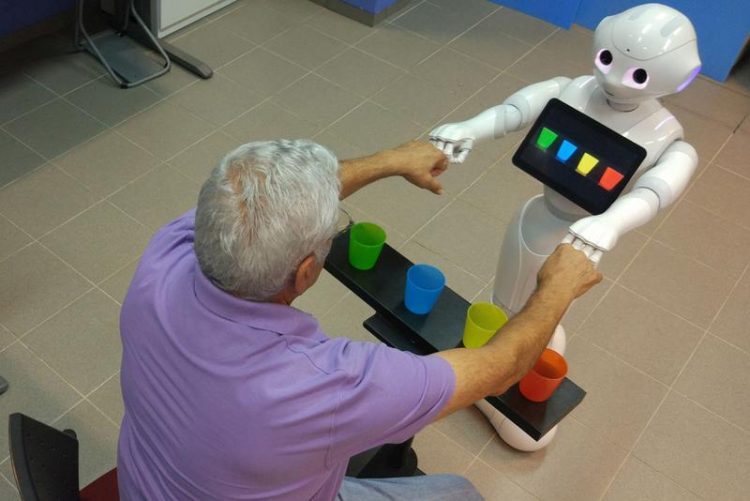Robots as Tools and Partners in Rehabilitation

A robot congratulates a patient for correctly sorting the colored beakers. Photo: Shelly Levy-Tzedek
In future decades the need for effective strategies for medical rehabilitation will increase significantly, because patients’ rate of survival after diseases with severe functional deficits, such as a stroke, will increase. Socially assistive robots (SARs) are already being used in rehabilitation for this reason.
In the journal Science Robotics, a research team led by neuroscientist Dr. Philipp Kellmeyer of the Freiburg University Medical Center and Prof. Dr. Oliver Müller from the Department of Philosophy of the University of Freiburg, analyzes the improvements necessary to make SARs valuable and trustworthy assistants for medical therapies.
The researchers conclude that the development of SARs not only requires technical improvements, but primarily social, trust-building measures. Rehabilitation patients in particular are dependent on a reliable relationship with their therapists.
So there must be trust in the safety of the robotic system, especially regarding the predictability of the machines’ behavior. Given the ever-growing intelligence of the robots and with it their independence, this is highly important.
In addition, robots and patients can only interact well, the scientists explain, when they have shared goals that they pursue through the therapy.
To achieve this, aspects of philosophical and developmental psychology must also be taken into account in the development of SARs: the ability of robots to recognize the aims and motives of a patient is a critical requirement if cooperation is to be successful. So there must also be trust for the participants to adapt to one another.
The frustration felt by patients, for instance as a result of physical or linguistic limitations, would be avoided if the robots were adapted to the specific needs and vulnerabilities of the patient in question.
Philipp Kellmeyer and Oliver Müller are members of the Cluster of Excellence BrainLinks-BrainTools of the University of Freiburg. The study also involved Prof. Dr. Shelly Levy-Tzedek and Ronit Feingold-Polak from the Ben Gurion University of the Negev, Israel. In the 2018/19 academic year, the Freiburg researchers together with the legal academic Prof. Dr. Silja Vöneky and the IT specialist Prof. Dr. Wolfram Burgard, both from the University of Freiburg, are developing a Research Focus into normative aspects of interaction between people and autonomous intelligent systems at the Freiburg Institute for Advanced Studies (FRIAS).
Contact:
Dr. Philipp Kellmeyer
Translational Neurotechnological Lab (AG Ball)
Department of Neurosurgery at the Freiburg University Medical Center
and BrainLinks-BrainTools
University of Freiburg
Tel.: + 49 761 270-87570
philipp.kellmeyer@uniklinik-freiburg.de
Prof. Dr. Oliver Müller
Department of Philosophy and BrainLinks-BrainTools
University of Freiburg
Tel.: + 49 761 203-2432
oliver.mueller@philosophie.uni-freiburg.de
Weitere Informationen:
https://www.pr.uni-freiburg.de/pm-en/press-releases-2018/robots-as-tools-and-par…
Media Contact
All latest news from the category: Information Technology
Here you can find a summary of innovations in the fields of information and data processing and up-to-date developments on IT equipment and hardware.
This area covers topics such as IT services, IT architectures, IT management and telecommunications.
Newest articles

Compact LCOS Microdisplay with Fast CMOS Backplane
…for High-Speed Light Modulation. Researchers from the Fraunhofer Institute for Photonic Microsystems IPMS, in collaboration with HOLOEYE Photonics AG, have developed a compact LCOS microdisplay with high refresh rates that…

New perspectives for material detection
CRC MARIE enters third funding period: A major success for terahertz research: Scientists at the University of Duisburg-Essen and the Ruhr University Bochum have been researching mobile material detection since…

CD Laboratory at TU Graz Researches New Semiconductor Materials
Using energy- and resource-saving methods, a research team at the Institute of Inorganic Chemistry at TU Graz aims to produce high-quality doped silicon layers for the electronics and solar industries….



